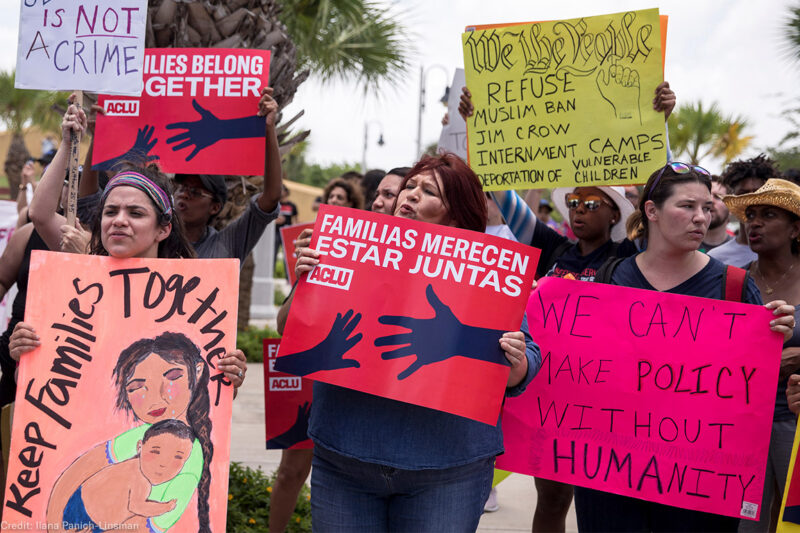
Under the Trump administration, millions of immigrants for whom the U.S. is home live with the constant fear that they or their family members could be imprisoned or deported at any time. Federal immigration agents are conducting workplace and community raids across the country, arresting immigrants at check-in appointments and green card interviews, and targeting courthouses and Greyhound bus stations. From 2017 to 2018, the federal government detained almost 400,000 people and deported 256,000 people.
But the Trump administration is not alone in its responsibility for the past two years of brutal immigration enforcement. The administration has taken radical measures, but it also relies heavily on longstanding enforcement practices and on laws passed by Democrats and Republicans in the decades before Trump came into office.
The next president’s mandate will be to overhaul our immigration system and build one that upholds our values.
That’s why, as part of the ACLU Rights for All program, volunteers are asking presidential candidates to commit to reforms that represent crucial steps toward a transformation of our immigration system.
The next president must:
1) champion legislation to create fair and achievable paths to citizenship for undocumented immigrants
2) end the use of Immigration and Customs Enforcement (ICE) detainers, which are the linchpin in ICE’s reliance on local police as “force multipliers” to carry out their mass deportation agenda
3) cut the size of the immigration prison system by at least 75%
The next president must work with Congress to create a pathway to citizenship for the approximately 11 million undocumented Americans. Two-thirds of undocumented adults have been here for at least 10 years; about 5 million U.S.-citizen children live with at least one parent who is undocumented; and undocumented adults make up about nearly 5% of the workforce. As long as these individuals are prevented from becoming citizens, we are institutionalizing a permanent underclass — primarily Latino, Asian, and Black — living and working in the U.S. but often unable to assert their civil and constitutional rights.
The next president must also commit to dismantling the inhumane and unfair enforcement system.
There are concrete steps the executive has the authority to take. First, he or she can end the use of “detainers” by Immigration and Customs Enforcement (ICE). An ICE detainer is a request to a state or local law enforcement agency to jail someone until the person can be taken into federal immigration custody. Detainers are the primary way that ICE drives up the number of immigrants it can arrest, because they rely on locally funded law enforcement officers to do the initial work for them. Detainers also racial profiling by local police, who might stop someone they perceive as an immigrant — often based on that person’s race or ethnicity — for a minor violation, with the actual goal of putting them on ICE’s radar.
Once arrested, immigrants are jailed in a detention system that has grown in size by 60% in just two years. Noncitizens in detention include asylum seekers, long-time U.S. residents, and green card holders. Overwhelmingly, they are simply awaiting court dates, and in many cases, they are jailed because of categorical rules that deny them release even if their detention is demonstrably pointless. There are multiple ways to attack this problem — to start, by cutting ICE’s budget; ending the detention of families, asylum seekers, and other vulnerable populations; and making bond hearings more fair. The ACLU is asking for a commitment to decreasing immigration detention by at least 75%.
These important steps would mark the beginning of a true overhaul, but not the end. We also believe the next president must end the militarization of our border and champion new legislation faithful to the principles of due process and equality to reform the laws governing immigration enforcement.
The United States has always lauded itself as a country that is welcoming to immigrants. In this presidential election, our candidates need to show their commitment to those ideals with specifics on policy.

